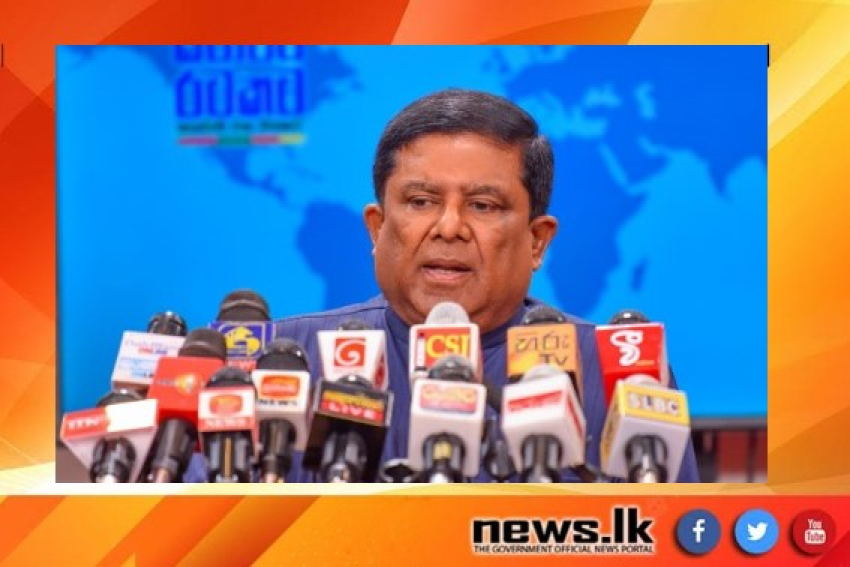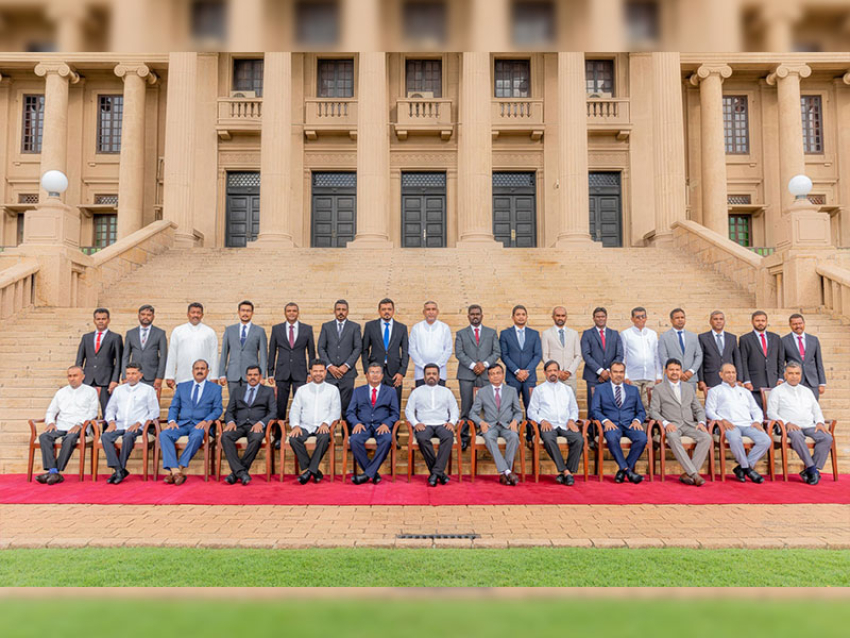President Ranil Wickremesinghe has introduced numerous ordinances to the Parliament within a remarkably short span of one year. Notably, he has successfully shepherded through the Parliament the most robust anti-corruption legislation in Asia, solidifying it as law and charting a course for the nation's advancement, said Mr. Wajira Abeywardena, the Chairman of the United National Party and a Member of Parliament.
Mr. Abeywardena made these comments, during his participation in a press conference held yesterday (21) at the Presidential Media Centre (PMC), under the theme “Collective path to a stable country”
Mr. Abeywardena highlighted the exceptional characteristic of Ranil Wickremesinghe's national leadership, emphasizing his capacity to collaborate effectively with groups, regardless of their compatibility. He stressed that the current moment presents a favourable occasion to leverage Wickremesinghe’s experience and knowledge for the betterment of the nation. He also emphasized the necessity for a comprehensive overhaul of the entire system.
Furthermore, Mr. Abeywardena pointed out that the prevailing political fragmentation within the Parliament poses a significant challenge to the nation's development. He called for an end to the practice of engaging with weaker politicians and urged everyone to rally behind the initiatives spearheaded by President Ranil Wickremesinghe, aiming to foster unity and progress in the country.
Mr. Abeywardena further elaborated on historical and contemporary political dynamics. He recalled that during the struggle for independence, Sri Lankan political parties collaborated cohesively. Even in the aftermath of an electoral loss where D.S. Senanayake forfeited 42 out of 98 seats, the alliance of Tamil leaders like Ponnambalan Arunachalam and Ponnambalan Ramanathan from the north, along with parties like the Lanka Sama Samaja Party, Communist Party, and independent groups, united to ensure Mr. Senanayake's appointment as the first Prime Minister of Sri Lanka. This unity played a pivotal role in achieving the nation's independence.
Following the attainment of independence, significant political developments unfolded. In 1952, for instance, the country witnessed the separation of Mr. Bandaranaike from established political parties, leading to the splintering of groups and the emergence of various new political entities. As a consequence, an estimated 75 political parties were established in Sri Lanka. It's crucial to note that this proliferation of parties and divisions within the political landscape played a role in contributing to the challenges and hardships faced by the nation, contributing to its decline and deterioration.
Mr. Abeywardena highlighted that the competition-driven promises made by these political parties eventually led to the country's financial bankruptcy. The culmination of this crisis was the people's rejection of all 225 parliamentary representatives.
Amidst this context, President Ranil Wickremesinghe, who assumed the roles of Prime Minister on May 12 and Executive President on July 20 of the previous year, is stepping forward as a national leader. His political journey has seen collaborations with figures like President J.R. Jayawardene, President Ranasinghe Premadasa, Mrs. Chandrika Kumaratunga, and Mr. Maithripala Sirisena, both as President and Prime Minister, and now with the Sri Lanka Podujana Peramuna.
This experience underscores President Wickremesinghe’s ability to collaborate harmoniously with groups, irrespective of their compatibility, setting him apart as a unique national leader. Given the present circumstances, the nation has a timely opportunity to harness his experience and knowledge for the collective welfare. President Ranil Wickremesinghe's track record includes the introduction of significant legislation aimed at safeguarding public safety, exemplifying his dedication to the nation.
The enactment of the anti-corruption act serves as a decisive measure to counter the political practice of misappropriation aimed at accumulating power within the political sphere. By introducing this powerful anti-corruption legislation and subsequently passing it in the Parliament, it not only legalizes the effort but also guides the country towards a more righteous trajectory.
Addressing the root causes of the nation's financial challenges, particularly the Ministry of Finance and the Central Bank of Sri Lanka, necessitates a comprehensive restructuring. This entails a complete overhaul of the political system, a step critical for the country's future. Such transformation aligns with the aspirations of the young generation, calling for a paradigm shift.
The Constitution, specifically in Chapters 27(1), 28, and 29 of the Sixth Chapter, outlines the principles and fundamental duties that guide public policies. These include addressing the fundamental rights, housing, and language needs of the Sri Lankan population. Notably, Chapter 27(c) underlines the responsibility of all politicians in ensuring citizens achieve a satisfactory standard of living encompassing essential needs such as food, clothing, and housing comfort, while consistently striving for better living standards and proper utilization of social and cultural facilities.
Article 28 introduces these basic duties, and Chapter 29 clarifies that these provisions don't confer enforceable rights. Courts or tribunals are not empowered to enforce these duties, nor can legal questions be raised regarding compliance with these regulations. This reinforces the conceptual nature of these duties within the framework of the Constitution.
In light of this, the Act acknowledges the privilege of all political parties to express their viewpoints on stage, even if these involve falsehoods. To curb this tendency, President Ranil Wickremesinghe, during his tenure as the Minister of Finance, established a budget office within the Parliament. This establishment serves to safeguard the principles outlined in Articles 27, 28, and 29 of the constitution. The legislation has been introduced with the intent to monitor and regulate the dissemination of untruths among political parties. Notably, Section 3 of Paragraph 20 plays a significant role, designating the Parliamentary Budget Office as an autonomous entity answerable to the Parliament.
The Act mandates that political parties and independent groups, regardless of whether they are supervised or not, must adhere to specific guidelines. Section 33(1) stipulates that members of Parliament, recognized political parties, or independent groups can request the Parliamentary Budget Office to prepare analyses as outlined in Section 29. Additionally, Section 25(3) mandates that the Parliamentary Budget Office formally request a costing analysis of a manifesto by the leader of a recognized political party or independent group before the Parliament's dissolution.
President Ranil Wickremesinghe’s assumption of the role of Prime Minister on May 12 and his subsequent Presidency on July 20 were necessitated by the absence of viable solutions from the opposition and other political parties to avert the country's bankruptcy. The Act now empowers a specific political party or independent group to serve the public interest instead of propagating falsehoods.
President Ranil Wickremesinghe is actively engaged in rebuilding the financially stressed country. His initiatives have garnered support from esteemed international bodies such as the International Monetary Fund (IMF), the World Bank (WB), the Asian Development Bank (ADB), as well as several countries including Japan, China, and France. He has shared his nation-building agenda with the public through the Parliament, and in the event of its failure, opposition politicians are encouraged to propose alternative solutions rather than perpetuate falsehoods.
The President consistently underscores that the success of his program depends on collective support. Working with both compatible and incompatible groups is crucial to achieving this. President Ranil Wickremesinghe's extensive experience as Prime Minister under various administrations positions him as a national leader with substantial insight.
Focusing on media development is paramount for Sri Lanka. Countries like Singapore have introduced robust media-related legislation, such as the Info-communications Media Development Authority (IMDA) Act. There is a need to transform Sri Lankan media to the calibre of globally recognized outlets like BBC, Al Jazeera, and CNN. A dedicated Media Act is required for this transformation. While a significant bill like the Broadcasting Authority Act has been introduced to the Parliament, opposition from groups opposed to discipline has emerged, hindering its progress.
PMD




















